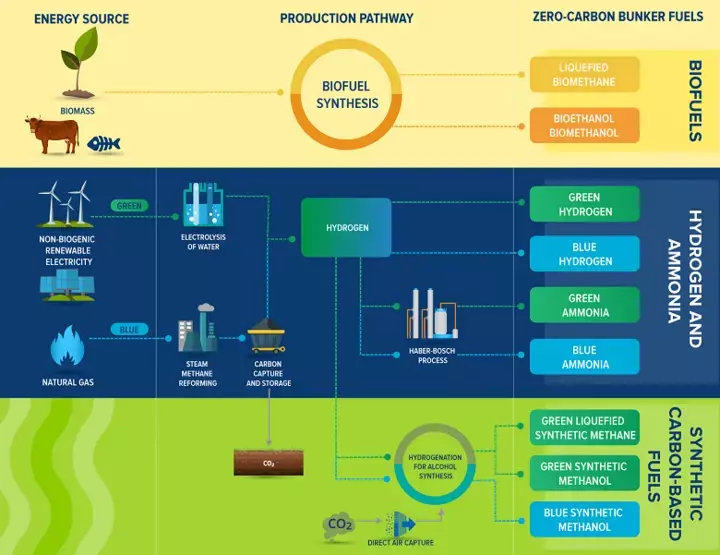LNG Solidifies Its Position as the Future Bunker Fuel of Choice
The maritime industry is experiencing a significant shift towards cleaner and more sustainable fuels. Among the various alternatives, Liquefied Natural Gas (LNG) has emerged as a leading contender to replace traditional bunker fuels. According to the latest data from DNV, LNG has solidified its position as the future bunker fuel of choice, with a notable increase in orders for LNG-capable vessels. This article explores the details of this trend and its implications for the maritime industry.
DNV’s alternative fuels insight (AFI) platform recorded 97 alternative fuel orders in October, with 66 of them being for LNG-capable tonnage. This represents a significant increase in demand for LNG-powered vessels, with the majority coming from the container sector. The data also shows that LNG remains the leading fuel choice, accounting for 23 of the vessels ordered, with 15 of them being container ships.
Technical Advantages of LNG as a Bunker Fuel
The technical parameters of LNG as a bunker fuel make it an attractive option for shipowners. LNG has a lower carbon content compared to traditional bunker fuels, resulting in reduced greenhouse gas emissions. Additionally, LNG-powered vessels can achieve significant reductions in nitrogen oxide (NOx) and sulfur oxide (SOx) emissions. This makes LNG a more environmentally friendly option compared to conventional fuels.
Growing Interest in Other Alternative Fuels
While LNG remains the dominant choice, there is also growing interest in other alternative fuels, such as methanol and LPG. The data from DNV highlights that 29 methanol-powered vessels and 2 LPG-powered vessels were ordered in October. However, LNG continues to lead with 609 LNG-fuelled ships already in operation and a further 565 vessels on order.
Impact on the Maritime Industry
The increasing adoption of LNG as a bunker fuel is likely to have a significant impact on the maritime industry. Shipowners and operators will need to invest in new vessels or retrofit existing ones to accommodate LNG fueling systems. This will require substantial investment in infrastructure, including the development of LNG bunkering facilities and supply chains.
The shift towards LNG will also have implications for the global supply chain, with a potential increase in demand for LNG from countries with existing infrastructure. This could lead to new trade opportunities and economic growth in regions with established LNG production and export facilities.
Environmental Impact
The adoption of LNG as a bunker fuel is expected to have a positive impact on the environment. LNG-powered vessels can achieve significant reductions in greenhouse gas emissions, NOx, and SOx emissions, compared to traditional bunker fuels. This will contribute to a cleaner and more sustainable maritime industry, aligning with the International Maritime Organization’s (IMO) goals to reduce emissions from shipping.
Key Statistics
- 609 LNG-fuelled ships in operation
- 565 LNG-fuelled vessels on order
- 66 LNG-capable vessels ordered in October
- 29 methanol-powered vessels ordered in October
- 2 LPG-powered vessels ordered in October
- 23 LNG-powered vessels ordered in the container sector
- 15 LNG-powered container ships ordered in October
Summary
The data from DNV highlights the growing trend towards LNG as the future bunker fuel of choice. With its lower carbon content and reduced emissions, LNG is an attractive option for shipowners and operators looking to reduce their environmental footprint. The increasing adoption of LNG will have significant implications for the maritime industry, including investment in new infrastructure and supply chains.
Conclusion
As the maritime industry continues to evolve, it is likely that LNG will play a major role in shaping the future of sustainable shipping. The shift towards cleaner fuels is not just an environmental necessity but also a strategic move that can open new economic opportunities. Shipowners and operators should consider the long-term benefits of investing in LNG-capable vessels and infrastructure to stay ahead in this changing landscape.
For those in the maritime industry, staying informed about these trends and adapting to new technologies will be crucial. Embracing LNG as a bunker fuel can be a significant step towards achieving sustainability goals while also positioning oneself for future growth and success.
List of Sources
- DNV: LNG was the fuel of choice during 2024 – SAFETY4SEA
- DNV: LNG dominated 2024 orders for alternative-fueled vessels
- LNG streaks past methanol as shipping’s alternative fuel of choice …
- LNG Dominates Alternative Fuel Vessel Orders as Methanol Demand Wanes
- LNG shifts back into lead as shipping fuel of choice, DNV says
- DNV: 27 new orders for alternative-fueled vessels in November
- DNV: LNG headlining new alternative fuelled orders in Q3
- LNG builds on orderbook momentum – seatrade-maritime.com
- LNG gathers momentum in 2024’s strongest month for alternative fuel …
- LNG Leads the Way as Momentum Builds on Bumper Year for Alt Bunker Fuel …


Leave a Reply